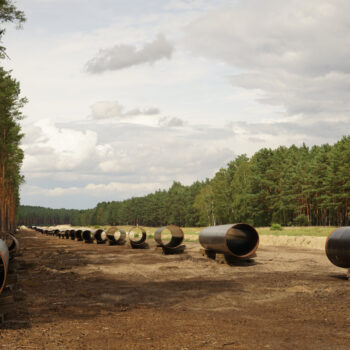The German Expert Council for Climate is expected to publish a report on the Immediate Climate Protection Programme, required under the Climate Law. It may point at the need for a more coherent government agenda.
- The German government considers clean energy acceleration central to its energy security response to Russia’s invasion of Ukraine.
- Over the summer, elements of an ambitious clean energy programme emerged, which have the potential to turn the German economy away from fossil fuels much faster than anticipated.
- Internal political struggles of the three-party coalition could leave critical holes in the programme that would undermine cohesion and effectiveness.
Story – German Climate Law and the Immediate Climate Protection Programme
On 25 August, The Expert Council for Climate Change will deliver a verdict on the Immediate Climate Protection Programme (“Klimaschutz-Sofortprogramm”) put forward by the Transport and Buildings Ministries. Under Germany’s 2021 Climate Law, the development of a sectoral programme was required as policy measures failed to sufficiently bring down emissions in those sectors in the preceding year. As climate policy increasingly becomes energy security policy in Germany, the verdict matters for both. It is expected to highlight that not enough has been proposed by either ministry. This highlights a conflict within the government that is struggling to secure a whole of government approach.
Since its inauguration, the German government promised to make climate and energy the centrepiece of its programme and promised a “climate team” of all ministers. This was a departure from previous governments’ energy policies that significantly increased dependency on Russian gas at the expense of climate policy. The Kremlin’s invasion of Ukraine has then led the country to turbocharge clean energy policies, but Russia’s weaponization of energy supplies has led to economic and social pressures which are testing the three-party government coalition’s ability to act effectively.
The possible firing up of old coal plants and plans for new LNG infrastructure have put Germany’s position internationally as a climate leader under strain.
In the medium term, the Germany government is clear that it wants to accelerate the transition to address the current energy crisis. It wants to double the share of renewables in the power sector by 2030, for instance by making 2% of land area available for wind and increasing tendering volumes. Despite short-term measures on coal, its ambition to ‘ideally’ phase out coal by 2030 isn’t in question1. This comes with concrete measures in the buildings sector, including higher standards and funding for energy efficiency and rules that de-facto prohibit the installation of new fossil-fuel heating devices. The now allocated “Climate & Transformation Fund” has earmarked €14bn annually for building renovation and €5bn for industry decarbonisation – out to 2026.
Many of these measures were enacted as part of the “Easter package” announced by Economy Minister Robert Habeck in March and since passing into legislation. A formerly planned follow-up package has been shelved, however, with the ministries for transport and buildings opting for individual “Immediate Climate Action Programmes”. This undermines a whole-of-government climate strategy on energy efficiency, heating, and transport that would ensure adequate financing strategies and technical support are in place.
It is widely understood that the coalition’s agreement to stick to fiscally restrictive policies advocated by liberal finance minister Christian Lindner, is holding up progress. The coalition is 2using scarce fiscal space to fund fuel subsidies (“Tankrabatt”) and lower VAT on gas; polices which have been criticized by economists and environmental organisations for keeping demand high.
However, the whole of government approach may not yet be dead altogether. In an interview over the weekend, finance minister, Christian Lindner (FDP) confirmed that the government was planning a whole of government climate program for 3 September. If the government is once again able to show internal unity around climate with policies that rise to the occasion, Germany can move toward UN climate talks in November as an international leader in transition.
Quotes
Ysanne Choksey, Policy Advisor on Fossil Fuel Transition at E3G said:
“Germany’s power revolution plans for 2030 show it is serious about moving away from coal. The images of coal barges getting stuck on the drought-stricken river Rhine reemphasise the macroeconomic urgency of this. Scholz now needs to get plans to increase energy efficiency and transform the heating and transport sectors over the line.”
Mathias Koch, Policy Advisor on Clean Economy at E3G said:
“There is tension between the mid-term ambition of the government to accelerate the energy transition in response to the current crisis, and a short-term lack of coherence between the different actors. The German government has been clear that the energy transition towards renewables is the only way to ensure affordable and reliable energy supply to Germany. It now needs to make sure that its emergency measures turbocharge rather than impede its ability to move away from fossil fuels.”
Johannes Schroeten, Policy Advisor on Sustainable Finance at E3G said:
“The ambitious climate policy of the government stands and falls with its ability to invest. The German finance minister now holds the key to ensure that the government can adequately invest in the climate, energy and economic security for the country.”
Available for comment
Ysanne Choksey (ENG, GER), Policy Advisor, Fossil Fuel Transition
m: +49 (0) 175 8344554, ysanne.choksey@e3g.org
Mathias Koch (GER, ENG, FR), Policy Advisor, Clean Economy
m: +49 (0) 160 9625880, mathias.koch@e3g.org
Johannes Schroeten (GER, ENG), Policy Advisor, Sustainable Finance
m: +49 (0) 160 95964443, johannes.schroeten@e3g.org
ENDS
Notes to Editors
- E3G is an independent climate change think tank with a global outlook. We work on the frontier of the climate landscape, tackling the barriers and advancing the solutions to a safe climate. Our goal is to translate climate politics, economics and policies into action. About – E3G
- For further enquiries email press@e3g.org or phone +44 (0)7783 787 863


